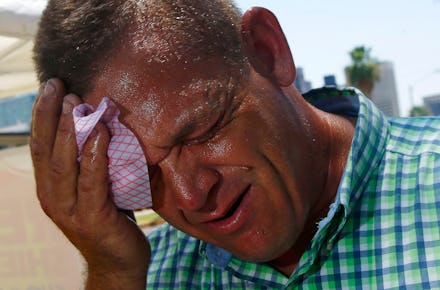People are way less likely to be helpful when it's hot out, according to study

If you’re in need of a little assistance from your friends you may want to wait for the temperature to cool down before asking any of them for a helping hand. According to a recent study published in the European Journal of Social Psychology, people are less likely to help out their fellow man when it’s too hot.
Using archival data comparing a Russian shopping mall in July and August of 2010 to the same months in 2011, the study, produced by researchers from Lehigh University and Northwestern University, found that retail store employees were 59% less likely to engage and help customers when they were working in an uncomfortably hot store, Quartz reported reported.
So what can a manager do to help over-heated employees? "If managers would like to encourage prosocial behavior in their organizations under adverse environment, they should try to minimize job-related stress and create comfortable environments for employees," Lehigh’s Liuba Belkin, co-author of the study, told TIME.
And while it may seem obvious that retail workers aren’t exactly jumping at the chance to assist customers in the blazing heat, what is more surprising is the team’s findings on their second experiment, which showed that when people merely think of hot temperatures they were less likely to be helpful.
For that experiment, TIME explained, half of the participants in a paid online survey were first asked to recall a time when they were uncomfortably warm. Next, those same people were asked to participate in a second survey for no additional compensation. A mere 34% were willing to take part in the second survey compared to 76% of a control group.
And just to ensure their findings were correct, the team conducted a third and final experiment. For the experiment, Quartz explained, students first listened to a lecture in a room that was set at 80 degrees Fahrenheit. Following the lecture the students were asked to fill out a survey, which they were told was to benefit a nonprofit organization for underprivileged kids.
The same procedure was repeated on a second class, however the second class was lucky enough to sit in a room set at 69 degrees Fahrenheit, according to TIME.
On average, students in the hot room only answered six of 100 survey questions. However, students in the cool room averaged 35, according to Quartz.
"The point of our study is that ambient temperature affects individual states that shape emotional and behavioral reactions," Belkin told Quartz, "so people help less in an uncomfortable environment, whatever the reason they come up with to justify why they cannot do something."